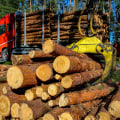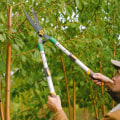Maintaining trees is crucial for a variety of environmental, aesthetic, and safety reasons, making it an important task for homeowners, municipalities, and businesses alike. Trees provide numerous benefits that extend beyond their immediate surroundings, impacting the broader ecosystem and community. One of the primary reasons for maintaining trees is their role in improving air quality. Trees absorb pollutants such as carbon dioxide, sulfur dioxide, and nitrogen oxides, and release oxygen through the process of photosynthesis. This natural filtration system is vital for urban areas, where pollution levels can be significantly higher. Well-maintained trees can also help mitigate climate change by sequestering carbon, thus reducing the overall concentration of greenhouse gases in the atmosphere. Maintaining trees is crucial for a variety of environmental, aesthetic, and safety reasons, making it an important task for homeowners, municipalities, and businesses alike. Trees provide numerous benefits that extend beyond their immediate surroundings, impacting the broader ecosystem and community. One of the primary reasons for maintaining trees is their role in improving air quality. Trees absorb pollutants such as carbon dioxide, sulfur dioxide, and nitrogen oxides, and release oxygen through the process of photosynthesis. This natural filtration system is vital for urban areas, where pollution levels can be significantly higher. Well-maintained trees can also help mitigate climate change by sequestering carbon, thus reducing the overall concentration of greenhouse gases in the atmosphere.
Another key reason for tree maintenance is their contribution to the overall aesthetic and property value of an area. Healthy, well-kept trees enhance the beauty of landscapes, providing shade, color, and a sense of tranquility. Properties with mature trees are often more attractive to potential buyers and can increase real estate values. Conversely, neglected trees can become unsightly and pose a detriment to property appeal. Regular pruning, trimming, and care ensure that trees remain visually appealing and structurally sound, preventing them from becoming overgrown or diseased.
Safety is another critical factor in the importance of tree maintenance. Overgrown or unhealthy trees can pose significant risks to people and property. Dead or weakened branches are prone to breaking and falling, especially during storms or high winds, which can lead to injuries or damage to homes, vehicles, and infrastructure. Regular inspections and maintenance help identify and address potential hazards before they become serious problems. This proactive approach can prevent accidents and reduce liability for property owners. Additionally, trees that are too close to power lines or buildings can create fire hazards or interfere with essential services, making their proper maintenance essential for community safety.
Maintaining trees also supports local wildlife and biodiversity. Trees provide habitat, food, and shelter for various species of birds, insects, and other animals. A well-maintained tree can support a diverse ecosystem, promoting biodiversity and contributing to the health of the environment. Neglected trees, on the other hand, can become breeding grounds for pests and diseases that can spread to other plants and trees, disrupting local ecosystems.
Furthermore, trees play a vital role in soil health and water management. Their root systems help stabilize the soil, preventing erosion and reducing the risk of landslides. Trees also enhance water retention in the soil, reducing runoff and promoting groundwater recharge. This is particularly important in urban areas where impervious surfaces like concrete can lead to increased flooding and reduced water quality. By maintaining healthy trees, we can support sustainable water management practices and protect our natural resources.
The economic benefits of tree maintenance should not be overlooked either. Well-maintained trees can reduce energy costs by providing natural shade and cooling, lowering the need for air conditioning during hot months. They can also shield buildings from wind, reducing heating costs in the winter. The initial investment in regular tree care can yield significant long-term savings and benefits.
In addition to these practical benefits, trees have been shown to improve mental and physical health. Access to green spaces and nature has been linked to reduced stress levels, improved mood, and better overall health outcomes. Trees and green spaces encourage outdoor activities and community engagement, fostering a sense of well-being and connection among residents.
Given the numerous benefits of tree maintenance, it is advisable to seek professional assistance to ensure that trees are cared for properly. Engaging a reputable tree service in Nashville, TN, for example, can provide the expertise and resources needed to maintain trees effectively. Professional arborists can assess tree health, recommend appropriate care, and perform necessary services such as pruning, fertilizing, and disease treatment. They can also help with the safe removal of hazardous trees or branches, ensuring that the landscape remains safe and beautiful.
In conclusion, maintaining trees is vital for environmental health, aesthetic value, safety, biodiversity, soil and water management, economic savings, and personal well-being. Regular tree care and professional services can ensure that trees continue to provide these benefits, contributing to a healthier, more sustainable, and more enjoyable living environment for all.






